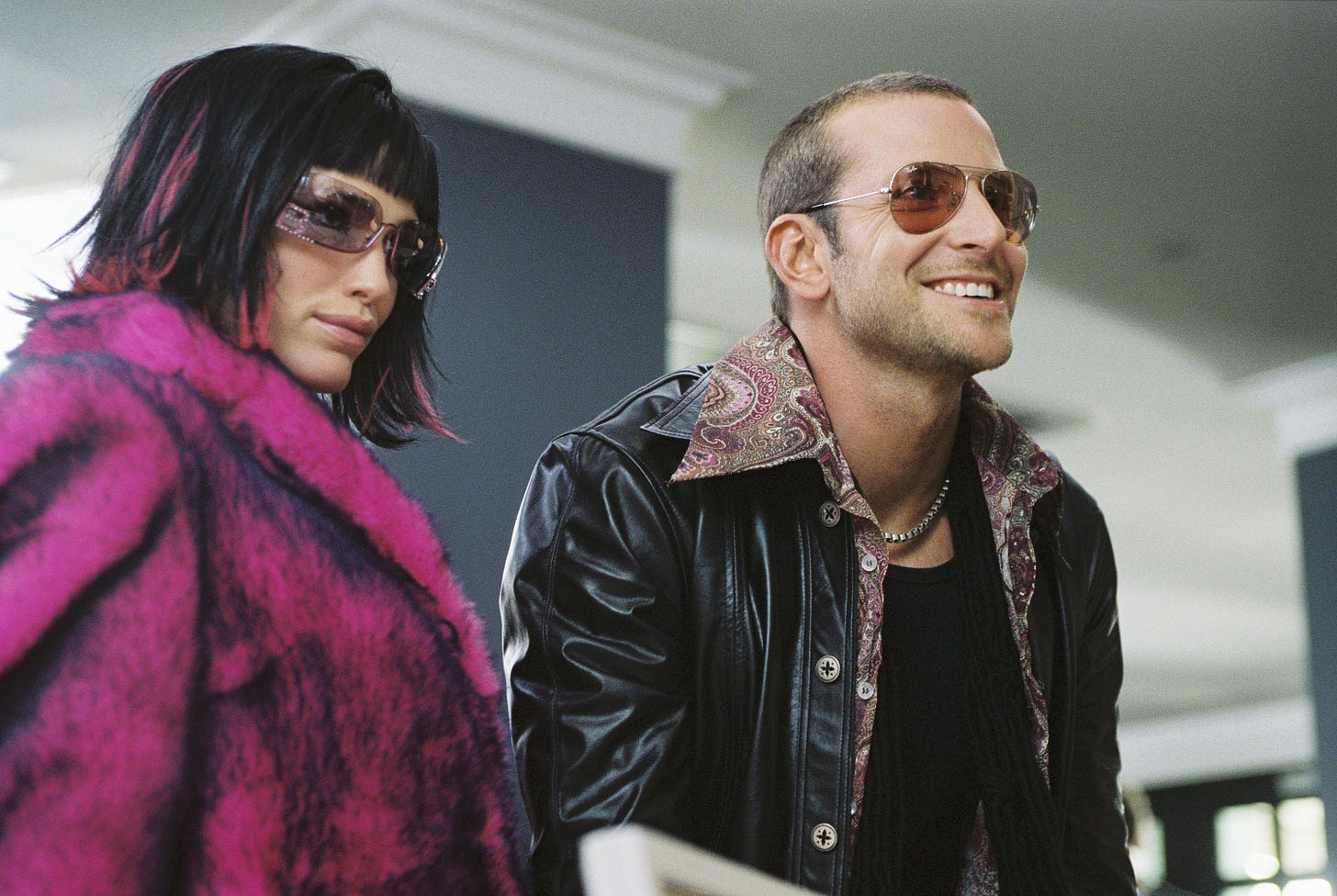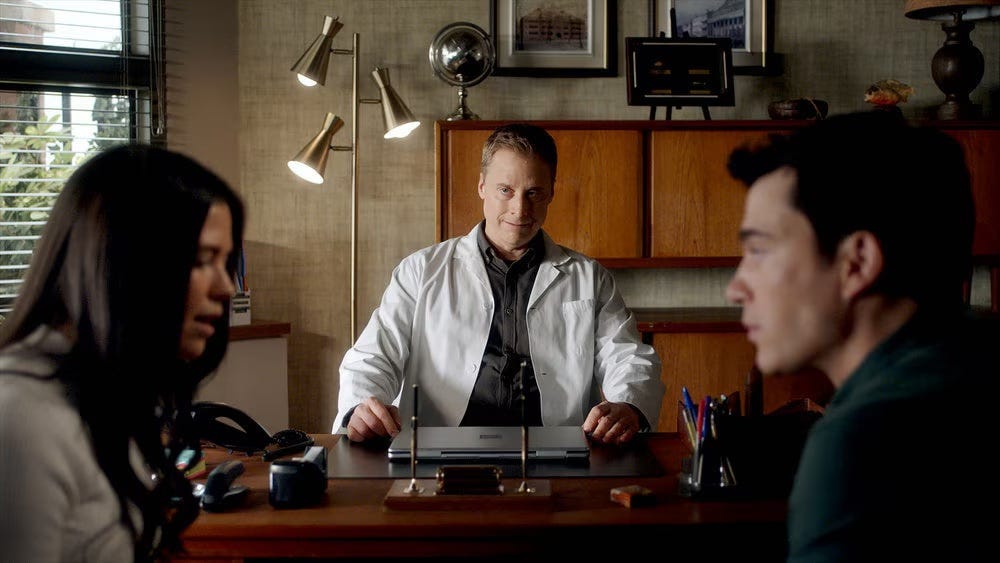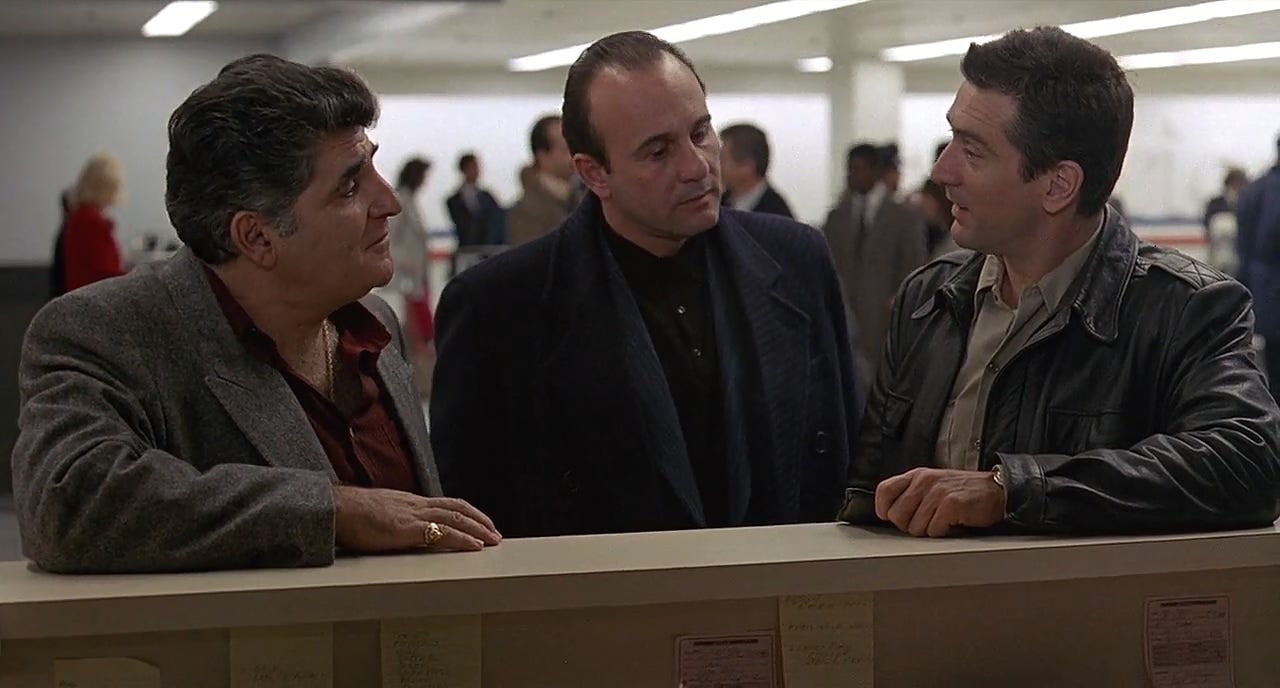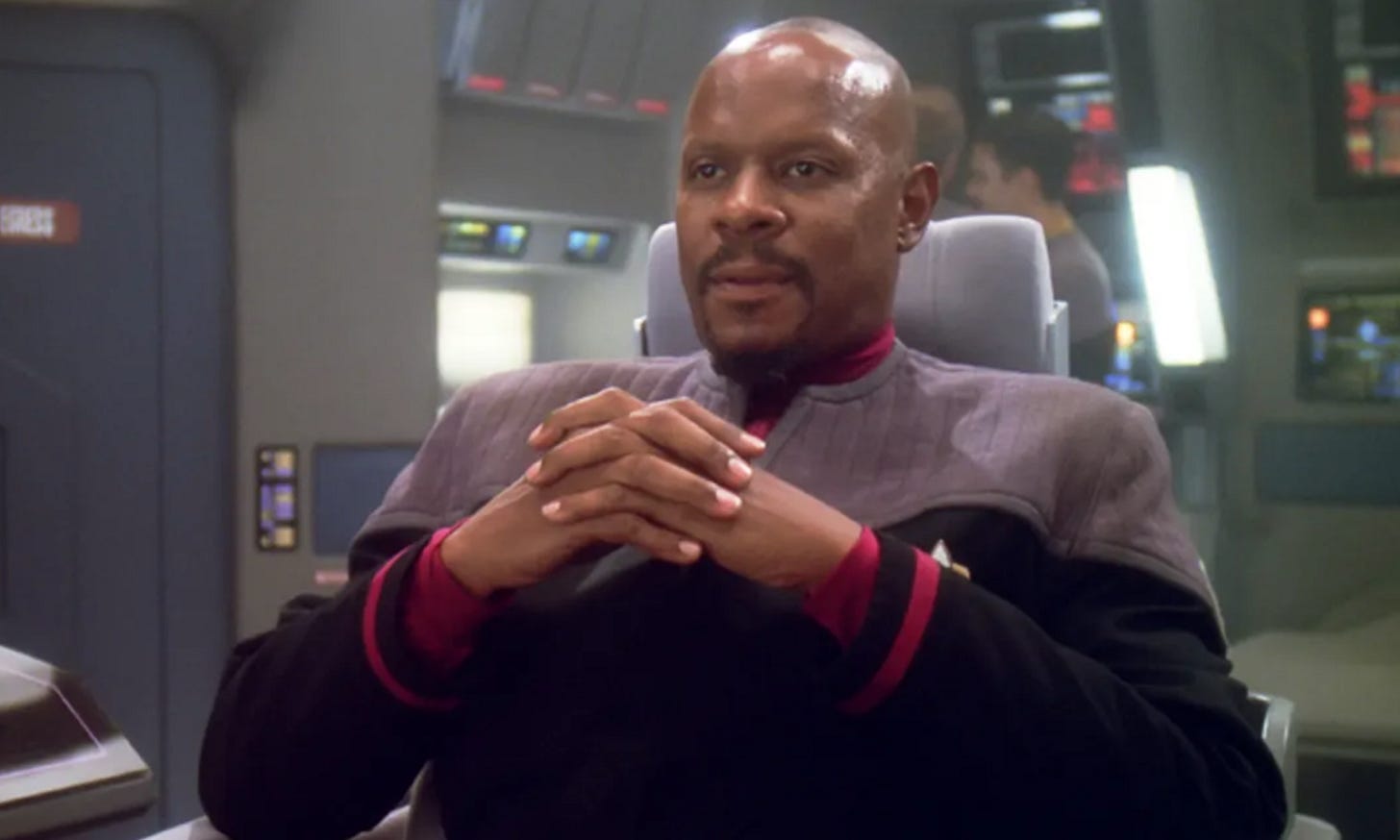Do you want to know a secret identity?
'Resident Alien,' 'Abbott Elementary,' a 'Star Trek: Deep Space Nine' rewatch, and more
This week’s What’s Alan Watching? newsletter coming up just as soon as it’s time for the teacher to become the janitor…
Who was that masked man? And why does he need a mask, anyway?
Among the things I enjoy about writing this newsletter is how it can turn into an inadvertent idea incubator. For last week’s newsletter, I wrote what was meant to be a quick bullet point about how I had finally caught up to the Season Three finale of Resident Alien. Then it became a very long bullet point, then it became its own newsletter item, and then I realized that there was a full column in what I had to say.
Specifically, this column is about how secret identities in TV shows — at least, identities that are kept secret from most or all of the supporting cast — are nearly always more trouble than they’re worth. I used Resident Alien as my example, not just because I recently finished it, but because Season Three helped prove my point. By looping the entire ensemble into at least part of the alien story, it finally made me interested in subplots about characters I once viewed as necessary evils to keep Alan Tudyk from being overworked to exhaustion.
Lots in this column, including an excuse to mention Will Tippin from Alias (and to use the photo at the top of the newsletter, which also helps prove my point, because why would you do a version of that show where Bradley Cooper couldn’t always look like that?), plus a few counter-examples, like The Americans and Breaking Bad, that managed to make it work over the long haul. (Though, as we often discuss here, Breaking Bad and Better Call Saul are the exception to pretty much every rule of TV storytelling.)
Odds and/or ends
Character actor Richard Foronjy died earlier this week. Like Tony “Paulie Walnuts” Sirico, Foronjy was a wiseguy who found a way to leave crime behind and transition into acting. I’ll obviously think of him first and foremost as Tony Darvo (aka Moron Number Two) from Midnight Run. But among his long list of credits was a supporting role in a short-lived, long-forgotten mid-’90s CBS crime drama I enjoyed, called Under Suspicion. RIP.
Getting back to the idea of streaming consolidation: earlier this year, Amazon’s Prime Video introduced an ad-supported subscription tier. Immediately, this sent up alarm bells about the future of Freevee, which was already an ad-supported streamer owned by Amazon (and which you could watch through your Prime Video app). While Amazon corporate still declines to comment on the official future of Freevee, it hasn’t been hard to read the writing on the wall, since most of the Freevee original series have been in limbo for years. Earlier this week, Shea Serrano tweeted that his charming autobiographical comedy Primo had been cancelled. It’s been more than a year and a half since the terrific Tegan & Sara bio-series High School dropped its first season; unsurprisingly, the cancellation news finally came down yesterday. At this point, I wouldn’t be surprised if the only scripted Freevee show to survive this purge would be Bosch: Legacy, since original recipe Bosch began life on Prime, and Jury Duty, which they’ll try to replicate if at all possible. But I highly recommend streaming both Primo (light, silly) and High School (heartfelt, sharply-observed) before they get Zaslav’ed.
Well, it’s about… I mean, it’s Abbott time
This week’s Abbott Elementary finale did the thing everyone’s been waiting three seasons for: Janine and Gregory kissed and, presumably, become a couple. Many fans of the show are happy about this. I’m simply relieved, because it means that Abbott can move on from what’s consistently been its least interesting element.
On most levels, I think Abbott is wonderful, and very much worthy of the legacy of The Office, Parks and Rec, and the other shows it’s inspired by. But the will-they-or-won’t-they of Janine and Gregory is the one area where the homage has gone too far. Or, rather, it’s the one area where it seems not enough thought went into how to make the homage make sense. The Office spent three seasons keeping Jim and Pam apart for what felt like plausible reasons: Pam was engaged to Roy when the series began, then Jim felt hurt by Pam’s rejection of him following the Casino Night kiss, and he moved to Stamford and began dating Karen. Janine was technically still in a relationship with Tariq at the start of Abbott, and both she and Gregory have dated other people, but none of these relationships felt like serious obstacles. And the periods where both were single but somehow didn’t get together just felt contrived: it was like Quinta Brunson and the other writers felt that they had pull a Jim and Pam but didn’t figure out how to make it make emotional sense. (That, or they had bought into the Moonlighting Fallacy.)
So what we had was two likable characters, who obviously belonged together, and rarely had a good reason to not be together. And the scenes of one or both of them pining for the other were never compelling enough to justify time spent away from all the things Abbott does so well. The finale on the whole was very funny, and an excellent spotlight for nearly every character — Janine included, during the stretch where the focus was on her attempt to control every aspect of her party. I’m just glad we’re done with the unnecessary throat-clearing. I feel safe in assuming that Janine and Gregory will be as amusing while paired off as they were while single, in the same way Leslie and Ben were on Parks and Rec. As individual characters, Jim and Pam were less fundamentally comedic than any of these other four, which is part of the reason The Office struggled to write them as a couple: their most interesting trait was the romantic tension between them, and there was nothing to replace that with once they began dating. That shouldn’t be the case here.
Going Deep again
Finally, as I’ve mentioned once or twice in the past, I’ve been doing a Star Trek: Deep Space Nine rewatch with one of my kids. We’re arriving at the finish line, with only the series finale left to go, and I had a few observations to share:
We didn’t watch every episode, skipping over the majority of the Ferengi comedy ones and some others that are either outright bad or completely forgettable. But I’d say we hit at least 80% of it, and it was a good reminder of the value of making seasons with 22 or more installments. Yes, the quality becomes much more hit-or-miss when you have to produce that many each year. (See also the frequent discussion of this in that book I published last year, which I think I’ve mentioned once or twice.) But the sheer amount of time spent with the characters pays huge dividends, because it means more when the big moments happen involving one or more of them. Much as I love Strange New Worlds, I don’t feel remotely as attached to Number One or La’an as I did to Kira or Bashir by the end of the second DS9 season. Many younger viewers refer to episodes that are either standalone or just okay as “filler,” but in the right show, I look at them as foundational. You can build something much more impressive on top of them than if you have much less material to work with. Look at something like “The Visitor,” which is one of the all-time best Trek episodes, period. In that one, Sisko gets unstuck in time, and we watch his son Jake devote the rest of his life to trying to bring his father back. It’s only as powerful as it is because we’ve seen a whole lot of stories in prior seasons — some good, many just adequate — about Jake, both on his own and in relation to his dad. It’s much harder to get that from shows that make 10 episodes per season for a few years.
Avery Brooks gives the weirdest performance of any of the live-action Star Trek captains. And there are stretches, particularly in the first couple of seasons, where he seems like he’s really struggling to find the right tone for Sisko. At times, he can come across as stilted; at others, as wildly over the top. But once he settles into the role — not coincidentally, around the time he regrows the goatee he wore so well as Hawk on Spenser: For Hire — he’s absolutely tremendous.
At the time, DS9 got dismissed by some Trekkies for being so unlike the original series and Next Generation: a static setting, no starship, lots of focus on ongoing political and spiritual conflicts. But it really works for the series, because it builds up this deep bench of recurring characters (with Gul Dukat as the best of those) and storylines that, like Sisko and Jake’s relationship, become more resonant the longer they stick around. Unlike the other ‘90s sci-fi show set on a space station, Babylon 5, there was no grand plan here from the start, but nearly all of it feels like part of the same impressive tapestry by the end.
One obvious weakness, apart from, again, the mostly cringe-inducing Ferengi stories: DS9 was pretty awful at romances. Odo spends years having an unrequited infatuation with Kira that we’re meant to find endearing, but instead plays as creepy obsession. (In one time travel episode, he allows thousands of people to be erased from existence, solely to save Kira’s life; in the moment, she’s horrified, but quickly seems to forget about it.) Worf — who admittedly never fit in as well here as he did on TNG — becomes an insufferable killjoy once he starts dating Jadzia Dax. (And the less said about the weird love life of Ezri Dax, the better.) Sisko and Kasidy Yates’s relationship was fine, but that also largely played out off-screen. No show is going to be good at everything, but you would think at a certain point, the DS9 writers would have recognized that they were particularly bad at this, and stopped doing it.
When I went back to rewatch The Sopranos to write The Sopranos Sessions, I was surprised to see that the first season was substantially less serialized than I — and many modern TV creators and fans — recalled. There are subplots that appear briefly in multiple episodes, but it’s not really until the last few where it all feels like one big thing. Similarly, my recollection is that the final DS9 season was almost wholly serialized to cover the Dominion War. Instead, most of it is still very episodic, with some episodes advancing the War arc, but many of them not, and it’s only the last third of the season where every episode leads directly into the next. Earlier in that year, there are three different episodes set almost entirely in the holosuites: one about baseball, two about fictional nightclub singer Vic Fontaine! All of which I enjoy, by the way — because, again, at a certain point time spent with the characters matters as much as the plot does, if not more. It’s just funny how easy it is to rewrite your own memories about a show you loved once upon a time.
Lower Decks has done a couple of episodes featuring DS9 characters, and the changelings figured into the final Picard season for a while. On the whole, though, it feels like the Star Trek overlords have missed an opportunity to tell stories set in the aftermath of the Dominion War, when the Alpha Quadrant would have been a much less stable place to travel. Instead, a franchise whose catchphrase is “to boldly go where no one has gone before” instead keeps retreating into nostalgia, with stories set in Trek’s glorious past. It’s, frankly, a miracle that Strange New Worlds is as good as it is, given how hemmed in it should be by what we know is coming for Pike, Spock, Uhura, and many other characters. And earlier this week, reports broke that Paramount wants Simon Kinberg to create a new Trek movie franchise, which would “involve the creation of the Starfleet and humankind’s first contact with alien life.” We’ve already seen the first contact, in a movie of the same name that’s among the better Trek films ever. And the early days of Starfleet were handled very, very poorly by Enterprise. Perhaps it’s overall prequel fatigue talking (again, with Better Call Saul as the exception that proves the rule), but I would very much appreciate it if Star Trek would stop doubling back to either retell familiar stories or unnecessarily fill in gaps in the mythology. Make it so, please?
That’s it for this week! What did everybody else think?







I for one would also enjoy a post-DS9 storyline, perhaps one where there’s a new Cold War between Earth and Cardassia, the same way DS9 mirrored WWII. To make it more timely, it would be mostly set on a frontier planet rife with dilithium variants, the same way China and the U.S. are competing for lithium. It would be filled with spies and opportunistic miners, and Starfleet sends someone to become the lawman of this desert world, in a very neo-Western manner that DS9 couldn’t quite achieve. It would probably even question Starfleet’s police power and the institutions of the Federation in a sociological, David Simon-esque way, fulfilling what DS9 tried to do with Section 31. Just some food for thought
DS9 has always meant a lot to me as it was airing when I was in my peak Trek teenage years. I recently revisited it when my son was born, watching episodes while he was asleep on me, or exhausted late at night when I couldn't sleep because I was too frazzled. I was surprised by just how well it all holds up. Yes there are some cringe moments, yes the romance is non-essential, yes episodes sometimes hand-wave away the consequences of quite traumatic incidents (O'Brien life-time mental incarceration for a crime he didn't commit, for example)... but still. The characters are well realised, the stories are often good to excellent, the emotional investment is there and many of the social issues it deal with feel just as or even more relevant as they did then.
As you say, it is a shame that modern Trek dwells so fully on TOS and TNG, overlooking what I honestly believe is the best TV show to carry the Star Trek name.